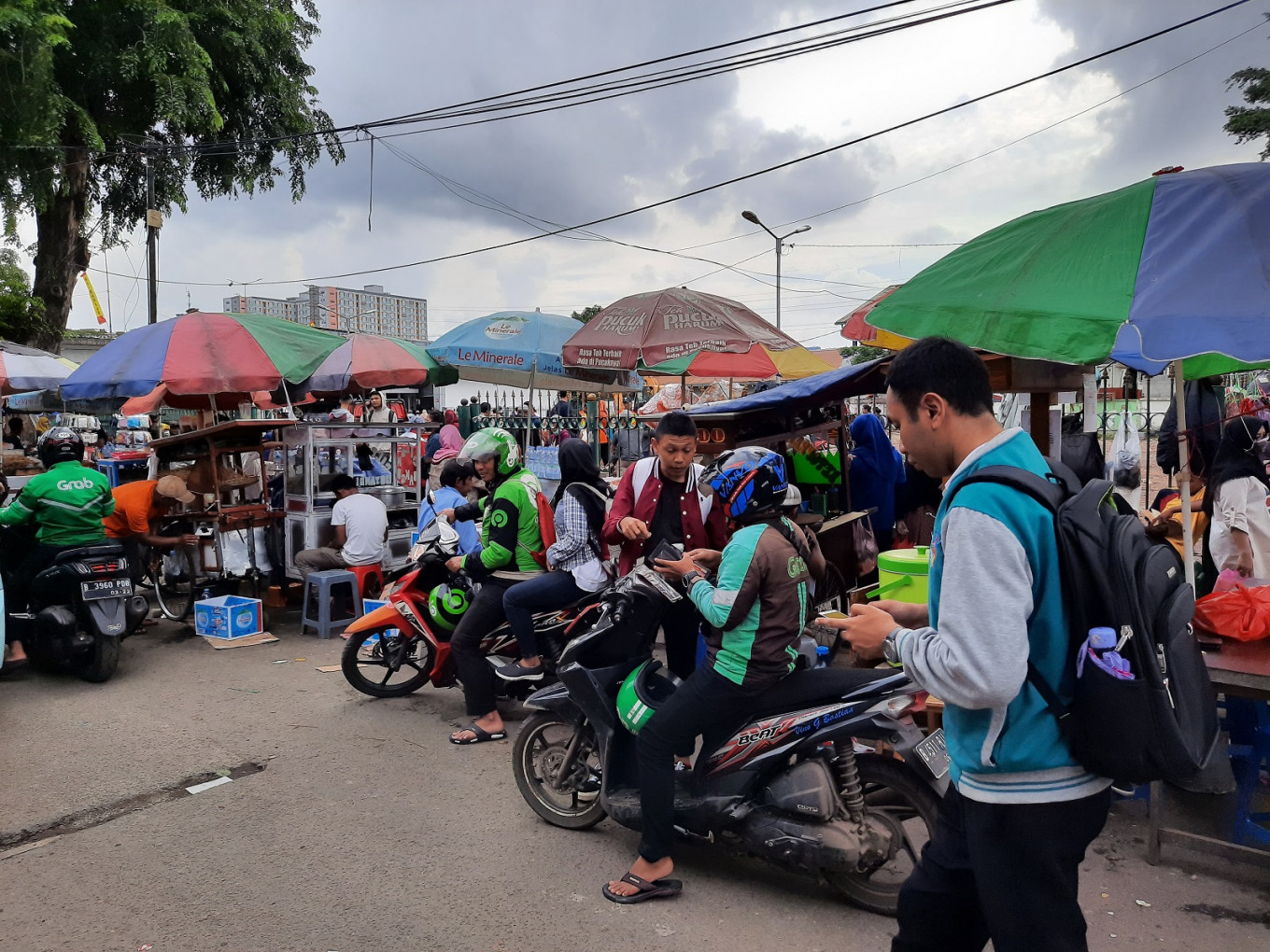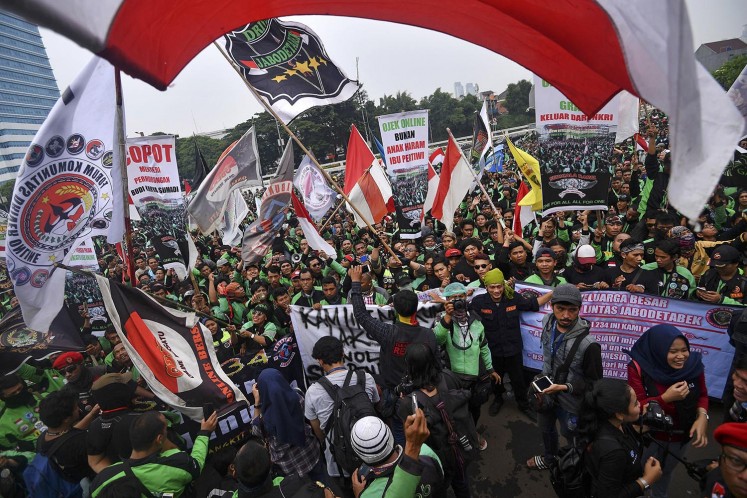Popular Reads
Top Results
Can't find what you're looking for?
View all search resultsPopular Reads
Top Results
Can't find what you're looking for?
View all search resultsWhat about the others? ‘Ojol’ relief sparks concerns over aid inequality
Analysts claim the government seems to pay more attention to app-based motorcycle taxi drivers compared with workers in other sectors, such as tourism.
Change text size
Gift Premium Articles
to Anyone
T
he government’s assistance for Indonesia’s estimated 4 million ojol (app-based motorcycle taxi) drivers, who are among the informal workers most affected by the COVID-19 pandemic, have sparked concerns over whether there is a certain degree of favoritism by the government toward the drivers over other workers in the country.
This idea was reinforced by the image of President Joko "Jokowi" Widodo's car, with its trunk open, and his security officers handing out an estimated 400 staple food packages to ojol drivers in the Harmoni area of Central Jakarta last week.
The gesture followed the issuance of Transportation Ministerial Regulation No. 18/2020, which was also passed on the same day, giving ojol drivers legal leeway to transport passengers, despite a previous Health Ministry regulation that prohibited them from carrying customers as part of the efforts to contain the COVID-19 outbreak. They initially were only permitted to transport goods.
Read also: Can we take motorcycle taxis? Clashing regulations leave passengers confused
State-owned oil and gas company Pertamina also announced on Tuesday that a total of 10,000 ojol drivers would be eligible for 50 percent cashback when they purchased non-subsidized fuel through the firm’s app MyPertamina.
Tadjudin Noer Effendi, a labor expert from Gadjah Mada University, suspected that the government’s gestures were due to the political power that the drivers wield through sheer numbers, their ability to coordinate protests and the solidarity among them.
“Whenever the drivers stage a protest, Jakarta is crippled. It is possible that the government sees that whenever they organize rallies all over Indonesia with their sizeable numbers, they are a political force,” he said.
Since its establishment in 2010, homegrown decacorn Gojek has signed up at least 1.7 million ojol driver partners in Indonesia. Rival app Grab entered the Indonesian market in 2014 and has operated alongside Gojek ever since.
Furthermore, given the uncertain legal status of motorcycle taxis, the drivers have formed strong driver associations such as the Two-Wheeled Action Movement (Garda), with its 100,000 members, which has actively voiced drivers’ demands throughout the years.
Thousands of online 'ojek' (motorcycle taxi) drivers rally in front of the House of Representatives building in April last year. They demanded that the government regulate tariffs. (Antara/Sigid Kurniawan)Tadjudin was of the view that the government did seem to pay more attention toward the drivers compared with workers from other sectors, like tourism.
Indonesian Hotel and Restaurant Association (PHRI) data show that 1,642 hotels have temporarily closed as of April 15 with Tourism Ministry data revealing that around 200,000 workers in the tourist sector have been affected by the COVID-19 outbreak.
Some 2.8 million people have lost their jobs so far this year, according to data from the Manpower Ministry and the Workers Social Security Agency (BPJS Ketenagakerjaan). More than half have been furloughed or placed on paid or unpaid leave.
To date, Indonesians impacted by the pandemic still eagerly await the full disbursement of the Rp 110 trillion (US$7 billion) worth of social safety net programs allocated by the government, which includes cash transfers, staple food relief, the family hope program (PKH), free electricity and the preemployment card.
However, there is still a lingering worry about bureaucratic red tape that might hamper people in accessing the government aid, raising the question about who will be eligible to get it.
Social science scholar from Airlangga University Bagong Suyanto said the government should have more objective parameters in deciding on which people to help.
Read also: COVID-19: Govt to disburse aid for tourist and creative economy sectors
“[The people who are suffering] are not just ojol drivers. People who are laid off, whose businesses have gone bust are suffering as much as the ojol drivers,” he said, adding that the government should pay attention to workers in other sectors so as not to give an impression of unfairness.
Djoko Setijowarno of the Indonesian Transportation Society (MTI) and Felix Iryantomo, a researcher from the Transportation Study Institute (Instran), also criticized Pertamina’s policy and contended that the policy should be fair to other workers in the transportation sector such as taxi, bus and even bajaj (three-wheeled taxi) drivers.
“The program could lead to jealousy among other transportation business players,” they wrote in a statement.
They further argued that the workers on other public transportation modes such as bus drivers were in a more dire situation as they could not switch to logistics transportation in the way ojol drivers can.
Garda head Igun Wicaksono denied there was any special treatment for ojol drivers, although he said the drivers did need special attention from the government.
“Maybe people think that ojol drivers keep on getting the attention, but to us, it’s normal. The drivers who are still actively working have assisted people in their activities during the pandemic, we are the most at risk, so we need extra attention from the government,” he said, adding that the drivers’ income had plunged by 70 percent during the pandemic.
Read also: 70 million informal workers most vulnerable during pandemic
Leading expert at the Office of the Presidential Staff Donny Gahral Adian also denied special treatment for ojol drivers.
“Those prioritized are the ones who are truly suffering and having difficulties due to COVID-19, those who do not have any liquid assets, who truly have lost their income to support their daily needs,” he said over the phone.
He said that there would be a scale of priority based on the severity of the impact on people for the distribution of aid, and that accurate and reliable data collection would be ensured.











